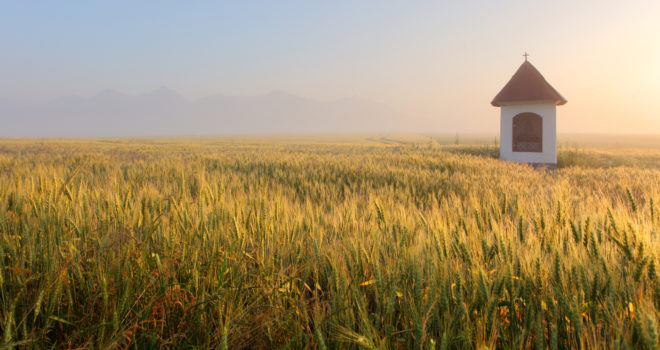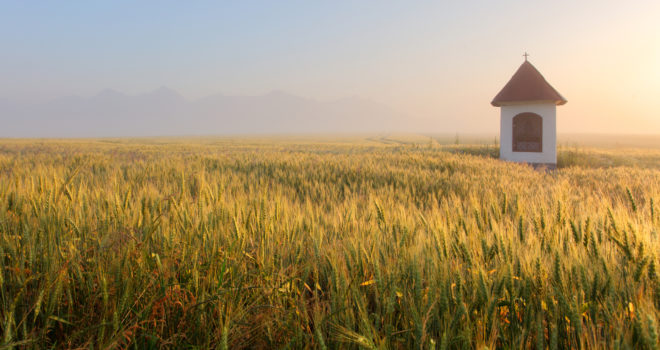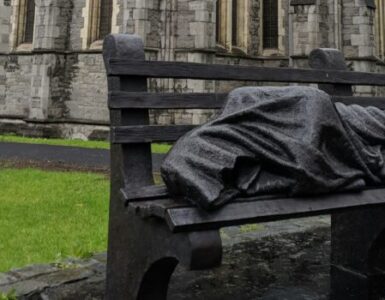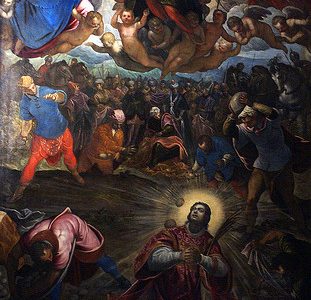God’s message to mankind, to farmers, stands out in Deuteronomy 28:8: “The Lord will command the blessing upon you in your barns, and in all that you undertake; and he will bless you in the land which the Lord your God gives you.”
Even in modern times, God speaks to man about farming through Pope Francis. At the Conference of the Food and Agriculture Organization in April 2018, the pope told the participants this: “Here as well, we must take another path, convincing ourselves that the products of the land have a value that we can all ‘sacred’ because they are the fruit of the daily labor of persons, families, and communities of farmers.”
Indeed, as summer is in full swing and bountiful crops cover the fields, all farmers—Catholic farmers—are toiling to harvest and to find buyers for what they have produced. Farmers do have several options for selling their crops, either at a farmers’ market, to restaurants, or through a Community-Support Agriculture, better known as a CSA.
As Catholic Rural Life suggests, rural parishes should consider offering church parking space to give local farmers a place to sell their fresh produce. Such farmers’ markets enable farmers and shoppers to make personal connections, eliminating the need for shoppers to scour local supermarkets for fresh produce and to allow farmers to sell directly to consumers without the middleman—and that benefits both shopper and farmer financially. As the Farmers Market Directory noted, since 1994, the number of farmers’ markets has grown from 2,000 to more than 8,600.
An internet search turned up several church parishes that offer property space for seasonal farmers’ markets. Before the pandemic, one of the very popular sites was the church parking lot at St. Veronica Catholic Church in Chantilly, Virginia. Numerous vendors selling everything from pastries to sausages, to lobsters, to fresh vegetables attracted shoppers every Thursday afternoon, and all who shopped had the benefit of entering the church to pray.
Another way to support local farmers is through the CSA. The CSA differs from the farmers’ market by allowing consumers to buy seasonal produce directly from the farmer with their farmer’s “shares” or “membership.” Members receive a box, bag, or basket of seasonal produce picked up at a designated location. Also, some CSAs deliver the goods directly to the customer’s home.
The McGinleys, Catholic farmers in Emmitsburg, Maryland, have used both farmers’ markets and their own CSA. As Casey-Mae McGinley said, they got into farming while her husband was in graduate school and prayed about becoming farmers. At that time, they were living in Bowie, Maryland and decided to look in the Gettysburg/Emmitsburg for farmland so they could be closer to their families.
They looked for property in that part of the county and the Daughters of Charity in Emmitsburg had some nearby land they offered to sell to the couple in 2017. After the McGinleys started their farming, they attended farmers’ markets in Frederick, Maryland and a smaller one in Emmitsburg. They also started a CSA since their first season in 2018. But she said, “We have four small children, and we did not want the added stress of traveling to a farmers’ market. God has provided the land for us, and He helped us build the house,” thanks to a builder from a big Catholic family in their parish.
That meant the couple switched from a farmers’ market to their own CSA, starting at first with only 10 families, and now serving 50 families, who buy the couple’s vegetables. The most popular? People love their tomatoes and corn, but the families get whatever is available that week. “Just a lot of people around us do their own gardening,” she said, “so it is not all that novel to have fresh vegetables, but people can supplement their garden with our CSA.”
Catholic rural farmer Max Becher, owner and farmer of First Steps Farm in Kennebec County, Maine, lays out his own farmer’s perspective. “There are pros and cons to every method of selling farm products,” he said. “At a farmers’ market, the farmer tends to get a higher price for his products since he is selling them at retail prices directly to the customer. If the farmer himself is able to be present at the farmers’ market instead of an employee, it fosters a connection between the farmer and his customers.”
However, as Becher noted, there is also a negative factor. Farmers are faced with packing up and driving their produce to a local market stand where after several hours, they must take pack it all up and drive it back to the farm. Added to their stress, weather changes and holidays can impact how many shoppers show up. And in the dead heat of summer, chances are perishable produce cannot be resold, a financial loss for the farmer. As he noted, “It’s definitely got its advantages, but it’s not a fit for everyone. So even if you are getting a higher price for your products, if you have to bring half of them home and throw them away or feed them to the animals, that’s a loss that the farmer incurs.”
For Becher’s family, driving to three markets per week drained family life and kept them off their farm. He noted that for the present, the crops they grow is for family use only.
As he concluded, however, “From a Catholic perspective, I believe the most important thing is for Catholic consumers to understand the benefits of buying directly from farmers, and keeping up the skills of preparing raw ingredients into delicious meals with their families in their own homes.” “Both those things build up the esteemed profession of the farmer and facilitate a healthy family life, both of which are important applications of Catholic social teaching which envisions a society where family farmers flourish and are respected, and families work together in the procurement and preparation of their food. Both those things can be facilitated by a family participating in either a farmers’ market or CSA.”
✠















